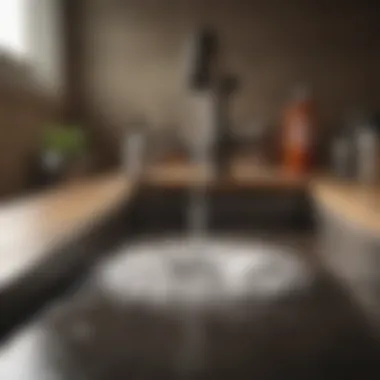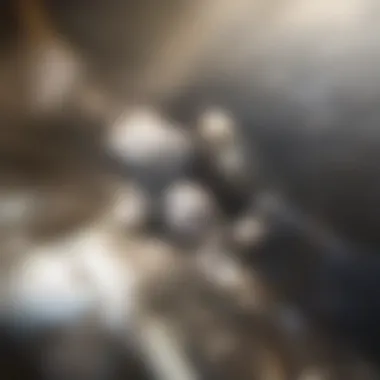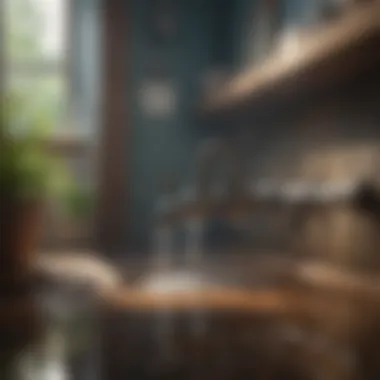Natural Solutions for Unclogging Drains at Home


Intro
Clogged drains often present a common yet irritating issue for homeowners. These blockages can stem from a variety of causes—from accumulated hair and soap residues in bathroom sinks to food particles and grease in kitchen drains. Though commercial drain cleaners are readily accessible, many individuals prefer natural solutions for health and safety reasons.
In this article, we will explore several effective home remedies that utilize simple ingredients typically found in households. By applying these methods, readers can address their clogged drains without relying on harsh chemicals that may cause harm to plumbing and overall health.
We will examine various techniques, focusing on their applicability and effectiveness. Understanding preventative strategies alongside actionable methods will equip homeowners with the knowledge necessary to maintain proper drainage in their homes.
Prelims to Clogged Drains
Addressing clogged drains is a common challenge many homeowners face. It is not just a practical issue but also a significant inconvenience that can affect daily activities. Understanding clogged drains is essential to properly manage these situations and find appropriate solutions. This article aims to provide insights into effective home remedies that utilize natural ingredients, reducing reliance on chemical solutions.
Understanding Drain Blockages
Clogged drains are often the result of a buildup of materials within the pipes. Various substances can contribute to this blockage. Food remnants, hair strands, grease, and soap residue can accumulate over time, narrowing the passage and slowing down drainage. If not addressed promptly, even minor clogs can evolve into significant blockages, leading to further complications such as pipe damage or sewage backups. Knowledge about how drain blockages develop empowers homeowners to take control of their plumbing and maintain an efficiently functioning system.
Common Causes of Clogs
Several everyday activities can lead to drain issues. Here are some common factors:
- Food waste: Scraping dishes without proper disposal methods can allow bits of food to enter the drain.
- Hair: Shower drains typically collect a significant amount of hair, which can clump together and cause severe blockages.
- Grease: Cooking oils and fats can solidify in pipes, creating a sticky substance that traps other debris.
- Soap residue: Certain types of soap can create a scum that builds up over time, contributing to clogs.
Understanding these causes can help in adopting preventive measures to keep drains clean and functional.
Why Choose Home Remedies?
The choice to use home remedies for clearing clogged drains rests on several key factors. Many homeowners experience frequent blockages and seek solutions that are both accessible and effective. Home remedies, often utilizing simple ingredients, provide a practical alternative to commercial drain cleaners. These remedies not only clear clogs but also promote a healthier living environment.
The Downsides of Chemical Drain Cleaners
Chemical drain cleaners can be highly efficient at clearing blockages. However, they come with a host of downsides. For starters, these products frequently contain harsh chemicals like sodium hydroxide or sulfuric acid. These substances can be highly corrosive, potentially harming pipes over time. This leads to
Basic Tools and Ingredients
Understanding the proper tools and ingredients is essential for effectively clearing clogged drains. This section emphasizes the significance of having the right equipment and materials at hand when you need to tackle a blockage. Familiarity with these items not only expedites the unclogging process but also ensures safety and efficiency.
Essential Tools for Unclogging
To successfully remove clogs, having specific tools is beneficial. The following tools are commonly used for this task:
- Plunger: A versatile tool that creates suction to dislodge clogs. It is effective for both sinks and toilets.
- Drain Snake: This flexible tool can reach deep into pipes, helping to remove stubborn blockages that a plunger cannot tackle.
- Pipe Wrench: Useful for loosening or tightening drain fittings. It offers a good grip, allowing users to manipulate plumbing effectively.
- Bucket: Always keep a bucket nearby. It can catch any water or debris released during the unclogging process, preventing mess.
These tools aid in executing various home remedies efficiently. Without them, attempts to clear a blockage can be frustrating. More often than not, the right tools can save time, adding convenience to the task.


Common Household Ingredients
Many effective remedies for clearing drains rely on common household ingredients. These items provide a natural way to unclog pipes without the adverse side effects of chemicals. Here are some notable ones:
- Baking Soda: Known for its alkaline properties, it works wonders when paired with vinegar to create a bubbling reaction that can dislodge blockages.
- Vinegar: This acidic ingredient – particularly white vinegar – helps break down buildup in pipes, enhancing the effectiveness of baking soda.
- Salt: Regular table salt can aid in loosening clogs. It works well in combination with baking soda and water.
- Dish Soap: This can aid in cutting through grease buildups, especially in kitchen sinks. Hot water can also assist in moving stubborn debris along the pipe.
Using these ingredients is not only eco-friendly but also cost-effective. They are typically available in most households, which means homeowners can quickly access them during an emergency. By combining these tools and ingredients, one can craft a comprehensive approach to maintaining clear drains.
Effective Home Remedies
Effective home remedies play a significant role in addressing clogged drains. Many people prefer using natural methods over commercial chemical cleaners, which can often be harmful to both plumbing and the environment. The beauty of these home remedies lies in their simplicity and accessibility. Common household items, such as baking soda, vinegar, and salt, can provide efficient solutions. This section will explore various methods, highlighting their unique benefits and application considerations. By employing these remedies, homeowners can save money while also promoting sustainability in their households.
Baking Soda and Vinegar Method
One of the most well-known methods for clearing clogged drains is the combination of baking soda and vinegar. This technique takes advantage of the chemical reaction that occurs when these two ingredients come together. When baking soda, which is a base, meets vinegar, an acid, they react to produce carbon dioxide - this reaction can help to break down grime and debris.
How to Use:
- Begin by boiling water and pouring it down the affected drain. This will help to loosen any initial build-up.
- Next, pour half a cup of baking soda directly into the drain. Let it sit for a few minutes.
- Follow with half a cup of vinegar. The bubbling and fizzing will occur; let it work for about 15 minutes.
- Finally, flush the drain with another pot of boiling water.
This method is not only effective but also non-toxic, making it safer for homes with pets and children.
Boiling Water Technique
Often underestimated, the boiling water technique can be quite effective against minor clogs. Boiling water can dissolve soap scum and grease that build up over time. This simple remedy is quick and requires no special ingredients.
How to Use:
- Boil about a kettle of water.
- Carefully pour the boiling water directly down the drain in stages. Allow a few moments between each pour.
Using this method regularly can prevent the formation of clogs in the first place, making it more of a preventative measure.
Salt and Baking Soda Approach
The combination of salt and baking soda is another effective remedy. Salt acts as a desiccant and abrasive, which can help dislodge debris, while baking soda aids in breaking down tough materials.
How to Use:
- Mix one cup of salt with one cup of baking soda.
- Pour this mixture down the drain, followed by a pot of boiling water.
- Let it sit for several hours or overnight for best results.
This method works exceptionally well for stubborn clogs that resist other treatments.
Dish Soap and Hot Water Method


Dish soap is not just for washing dishes. It can be used to clear clogs too, especially if grease is involved. The lubricating qualities of dish soap can help loosen build-up in the pipes.
How to Use:
- Squirt a generous amount of dish soap into the drain.
- Follow it with a pot of hot (not boiling) water.
- Allow it to sit for 10-15 minutes and then flush with more water if needed.
This method is excellent for kitchens where grease is often the cause of the clog.
These remedies leverage natural substances and encourage DIY solutions. They prove that one can avoid chemicals while effectively maintaining drainage systems.
By incorporating these home remedies into regular maintenance, individuals can vastly improve the efficiency of their drains and minimize the chances of future blockages.
Step-by-Step Instructions
Offering clear step-by-step instructions is vital when discussing effective home remedies for unclogging drains. These guidelines take the guesswork out of the process and ensure that individuals can follow along with ease. Each method varies in complexity and effectiveness; hence structured guidance is necessary to help users apply these solutions safely and correctly. Well-explained steps can prevent potential mishaps and ensure optimal results, making the task manageable even for those without prior plumbing experience.
How to Use Baking Soda and Vinegar
Baking soda and vinegar is a common and powerful combination for tackling clogged drains. To use this method, start by pouring 1/2 cup of baking soda directly down the drain. After that, follow with 1/2 cup of vinegar. Cover the drain with a cloth or plug it if possible. Immediately, you will notice fizzing. This reaction helps to break down any buildup in the pipe. Wait about 30 minutes before flushing the drain with hot water to clear any residual debris. This method not only unclogs but also helps to deodorize the drain.
Applying Boiling Water Safely
Using boiling water is one of the simplest ways to clear minor clogs. First, boil a kettle of water. Once it reaches a rolling boil, carefully pour it down the drain in stages. Pour a little water, wait for a moment, then pour again. This allows the heat to work effectively against grease or soap residue buildup. This method is beneficial as it requires no special ingredients and can be repeated as needed. Be cautious, however, as pouring boiling water too quickly or in a single pour could splash back.
Executing the Salt and Baking Soda Method
This method utilizes the abrasive qualities of salt in combination with baking soda. Start by pouring 1/2 cup of baking soda down the drain, followed by 1/2 cup of salt. Let this mixture sit for about 30 minutes to an hour, allowing the abrasive nature of the salt to scrub the sides of the pipes. Afterward, flush the drain with boiling water. This method not only helps to clear the blockage, but it also prevents future clogs by keeping the pipes clean from within.
Using Dish Soap Effectively
Dish soap can be effective against greasy clogs. Begin by pouring a generous amount of dish soap directly into the drain. Allow it to sit for a while to break down grease. Next, rinse with hot water to help flush the grease through the pipes. For more stubborn clogs, consider heating the dish soap slightly before pouring it down, enhancing its ability to cut through grease and grime. This method is safe for most plumbing systems and satisfies those who prefer gentler methods over harsh chemicals.
Preventative Measures
Understanding how to maintain clear drains is essential. Preventative measures help avoid the issues that lead to clogs in the first place. These steps can save significant time and effort and can extend the life of your plumbing system. By adopting regular practices, you not only address the immediate concerns but also create a sustainable environment for your pipes. It ultimately results in fewer disruptions and repairs.
Regular Maintenance Practices
Implementing routine maintenance is key to preventing clogged drains. Here are some suggested practices:
- Clean drains regularly: Use boiling water weekly to flush out grease and soap buildups. It can dissolve some minor residues that accumulate unnoticed.
- Try using a mesh strainer: Install strainers in your sinks and shower drains to catch food particles, hair, and debris. This step reduces the chances of any material entering the plumbing and causing blockages.
- Flush with vinegar: Monthly, pour vinegar down your drain. It can help break down any potential build-up and neutralize odors.
- Check pipes for leaks: Regularly inspect your pipes for leaks or signs of wear. Noticing these signs early can prevent bigger problems later.
By routinely engaging in these practices, homeowners can significantly reduce the risk of clogged drains.


What Not to Put Down the Drain
Not all materials should go down the drain. Avoiding certain items can keep your plumbing system running smoothly. Here are key things to avoid:
- Grease and oils: These substances can solidify and create serious blockages over time.
- Food scraps: Even small bits of food can accumulate and lead to clogs. Dispose of waste properly instead of washing it down the sink.
- Hair and personal care products: Hair can tangle in pipes and create blockages. Regularly clean your bathtubs and sinks to avoid these issues.
- Paper products and wipes: Toilet paper is designed to dissolve, but other paper products do not, leading to clogs.
- Chemicals: Harsh chemicals can damage pipes and create future issues rather than solving immediate ones.
By recognizing what not to put down the drain, homeowners can take proactive steps to maintain healthy plumbing.
The importance of preventative measures cannot be overstated. Regular maintenance practices, combined with knowledge of what to avoid, equip homeowners with the tools they need to keep their drains clear and functional.
When to Seek Professional Help
Homeowners often try various DIY methods when faced with clogged drains. However, there comes a point when persistent issues signal the need for professional assistance. Understanding when to consult a plumber can prevent further damage to your plumbing system and save money in the long run. The importance of recognizing these moments cannot be overstated. This section will provide key elements that contribute to making that decision.
Signs of Severe Clogs
Identifying a severe clog can sometimes be straightforward. Here are some indicators that suggest it is time to bring in professional help:
- Water Backing Up: If the water begins to rise in other drains when one drain is in use, it indicates a more serious issue than a simple clog.
- Foul Odors: Persistent and unpleasant smells emanating from the sink or drain area can indicate decay or a significant blockage.
- Slow Draining: If water drains sluggishly despite trying home remedies multiple times, it's a sign that the issue is deeper.
- Multiple Clogged Fixtures: When more than one drain is affected simultaneously, it often points to a blockage in the main sewer line.
These signs require attention. Ignoring them could lead to more extensive damage and a higher repair bill. For example, a major backup could lead to sewer issues that affect your entire home.
Professional Solutions Available
Once you have decided to consult a professional, several solutions are typically available:
- Drain Snaking: Professionals often use a drain snake to remove clogs located further down the pipes. This tool can break up blockages that are out of reach for home methods.
- Hydro Jetting: This method involves using high-pressure water jets to clear out stubborn clogs and clean the pipes. It is both effective and environmentally friendly, as it uses only water without any chemicals.
- Camera Inspections: Plumbers may use a video camera to inspect the inside of pipes. This allows them to precisely locate the issue and determine the best course of action.
- Repair or Replacement: In severe cases where the pipe itself is damaged or corroded, replacement or repair may be the only solution.
"Knowing when to seek professional help can save you time, money, and potential plumbing disasters in the future."
In summary, while many effective home remedies exist for clearing clogged drains, certain situations call for professional help. Recognizing signs of severe clogs and understanding available solutions ensures that homeowners can make informed decisions, preserving the integrity of their plumbing systems.
Culmination
In the context of dealing with clogged drains, understanding effective home remedies proves essential for homeowners. This article has demonstrated that several natural solutions can restore proper drainage with minimal risk and environmental impact. By turning to everyday household ingredients, individuals can resolve their clogging issues without relying on harsh chemicals. This not only safeguards personal health but also protects local ecosystems from potential harm.
Recap of Home Remedies
A range of effective home remedies exists for clearing clogged drains, each utilizing common household items. Methods discussed include:
- Baking Soda and Vinegar Method: A classic approach that leverages the chemical reaction between these two ingredients to break down debris.
- Boiling Water Technique: Simple yet effective for dissolving grease and minor blockages.
- Salt and Baking Soda Approach: This combines abrasive and soluble properties for enhanced cleaning potential.
- Dish Soap and Hot Water Method: A practical option that effectively tackles grease build-up.
Utilizing these remedies provides multiple avenues to address drainage issues while reducing reliance on chemical cleaners.
Encouragement for Preventative Care
Engaging in regular maintenance is crucial for maintaining clear drains. Homeowners should consider adopting preventive practices such as:
- Routine Cleaning: Regularly flushing drains with hot water can significantly reduce buildup.
- Proper Waste Disposal: Ensuring not to dispose of grease, hair, or other clog-prone materials down the drain.
- Using Drain Covers: This can capture debris and prevent it from entering the plumbing system.
By being proactive and implementing these preventative strategies, one can greatly minimize the likelihood of clogs forming in the first place.



